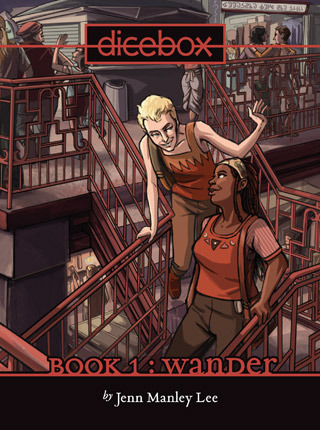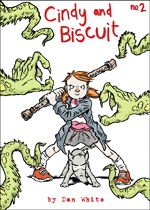Dicebox: review
February 13th, 2012

Full disclosure: I was asked to review this book by the author’s husband, Kip Manley, a lovely man, author of City of Roses, which is a smashing book I’d recommend to fans of Jonathan Carroll or that mid-1990s Vertigo vintage, so take that as you will. I’m sort of flailing with my critical armoire (contents: glibness, cruelty) and my comics readership, which includes basically no webcomics (which Dicebox originated as), bar Achewood, and certainly very little like this.
So, to my apparently utterly depthless comics-readership, what is Dicebox like? On first glance, I thought it might be a kind of a Bryan Talbot-esque kind of thing, but it isn’t at all, really – here’s some comics it’s a bit like, but really more unlike: well, it’s a bit like Alan Moore and Ian Gibson’s Halo Jones, of course, a bit like that, in that it has underclass female protagonists surviving in an interstellar future, but it doesn’t really rely on high-concept in anything like the same way the old 2000AD classic did. It’s a bit like Gilbert Hernandez’ Palomar tales, in that there’s a recombinant cast of largely women, and that this is the prime mover, these interrelationships, of the book. Lastly, it’s a bit like Adam Warren’s Empowered insofar as, there’s a fantastical setting, which is played almost entirely secondary to – actually visual – close-focus character-work. It suddenly occurs these are all comics written (and drawn) by men, with female leads, which leads to another damning indictment of my reading: looking at my graphic novel shelves, female creators there – Jill Thompson arting some Sandman, some Invisibles, a couple of these strips in the Bizarro World collection – are practically nonexistent, that these were hitherto my receipt of this review copy, literally the most female comics I owned. But more on that shortly.
It’s more not like any of those comics because, aside from the very barest of hints crinkling the edges of what is a fairly large (and lavishly-presented, seriously – I’ve never heard of Supersticery Press, and the only other accredited item I can google is Kip’s aforementioned novel, so I guess it’s a hella impressive cottage industry publisher) collection, there’s little of anything one would normally regard as “plot”. It’s ambulatory, a meander; to reiterate – the subtitle is wholly accurate. In fact, as Carla Speed McNeil puts it (whose Finder I, not having read, can only imagine – perhaps incorrectly via gender, proximity – is a better comparative than what I offer) – far more succinctly and on-the-nose than I can to the point I wonder if this review isn’t largely gilding the lily:
Dicebox is banal. No, hear me out: there’s a bunch of people hopping from planet to planet aboard this spaceship or that, surrounded by amazing things, and yet to them it’s all completely ordinary and sometimes even boring. Their everyday nuisances are miracles to us, and Dicebox drops us in the middle of all of this, right there with them, to make our way as best we can, and I am so very happy for the chance to do so.
So, yes – it’s maybe something of a disservice to describe it as ‘plotless’. There clearly is an underlying preset structure, Wander has 9 chapters of a mooted full 36, each evidently has some structural purpose, although it is sufficiently subtle in this first collection as to be effectively invisible to this reader, but I wonder if that isn’t an overall strength, really. The crux is – has to be, really, given Lee’s self-imposed limitations – on the lead characters, Molly and Griffen; and so they are foregrounded through talking head panels with naturalistic dialogue (I’d estimate around 75% of the work is exactly this in fact) and the work on – particularly the latter, Griffen is the book’s strongest point, Molly an identification character through which one experiences this abrasive, droll and difficult – I don’t really want to spoil this, another success of the book is its soft-sold creation of a post-gender, proletarian future – person of indeterminate gender (up to the point where one is told.) I don’t think I like Griffen? That’s not a criticism, not in the pejorative sense – easily the most compelling character in the book; hyper-competent yet living a life of near-itinerancy, consistently aggravating interpersonally, a hinted at former life in high places in some military org…
The art on sundry supporting characters also pulls off the difficult trick of making them what the work’s invented future terminology calls ‘peh’, what the internet today calls ‘ze‘ – this is another strength, that it is in some sense a creation of post-feminist (there’s no declamation around gender issues, sexuality appears to be fluid and simply not worthy of comment) space. Initially I found myself otherwise a little disappointed with the computer colouring on the art and found myself wishing it was in black and white, the palette overrendered in the way one might find in a latterday Marvel Comic as digitised by Frank d’Armata – albeit without quite the same ludicrous reliance on transparency effects, but at a point (in the afterword, with the Asides, whose genesis Lee mentions having been borne of a maternity break from the strip, I’m inclined to imagine she may have taken her own work apart in this time) after part 5, if I recall correctly, the colours take a quantum leap forward, and there are more scene establishing shots, which I was greatly appreciative of, the greater sense of imaginary physical spaces and their ambience. There’s actually some quite beautiful bits of colouring thereafter, that clearly convey phases of sunlight, but the book just felt… aerated for it all.
Over the piece – and in some sense, this is perhaps my failing as a reader, as a (gulp!) critic, that I was reading something I was really quite unaccustomed to – I initially found it quite hard to gain a toehold in the collection, and do still believe it was probably best experienced in its original form as a webcomic, but having done so, having had it garnished just enough with the SFX I evidently craved, having had the artist become better accustomed to and more confident in her toolkit, I do feel enriched by having encountered Dicebox. I don’t want to make it demarcative of – you know, of women-in-comics, or a “a comic as done by a woman”, because to do so would betray I think the work’s broader intent and content, but there was a final sense, to me, of new pathways, new vents in the medium and in the SF genre (which is so often entirely reliant on high-concept, but perhaps given we now live in a world of constant high-concept, it is perhaps time to read more humanised takes on such). I’m still curious why Molly loves Griffen, but that perhaps is a story for later…




Leave a Reply
You must be logged in to post a comment.